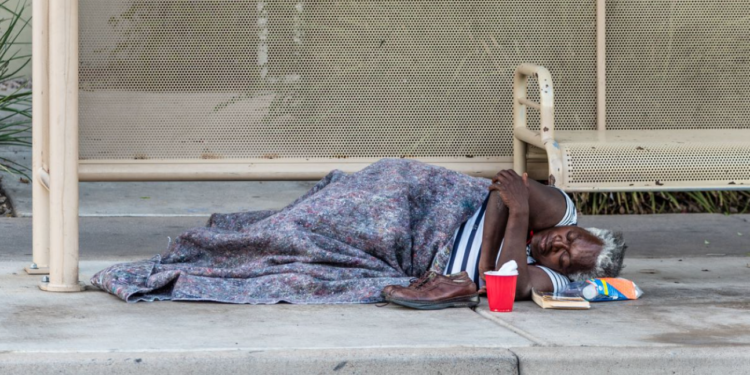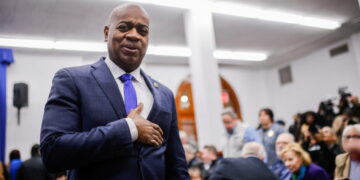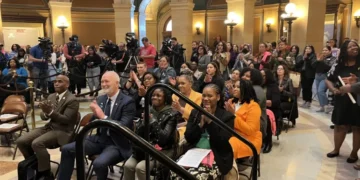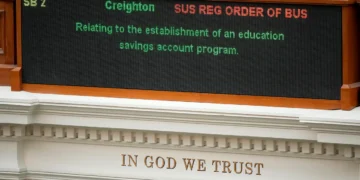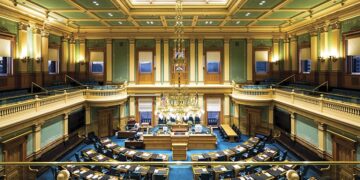Oct 8, 2024 Story by: Editor
A significant number of Black individuals living on the streets of Los Angeles is evident, especially in areas like Skid Row and Hollywood’s freeway offramps. Despite growing awareness of how systemic racism fuels homelessness, there has been little improvement in the over-representation of Black people among the homeless in Los Angeles, according to the Los Angeles Homeless Services Authority’s latest report.
The January count revealed that 21,509 Black individuals lacked stable housing, making up 34% of the city’s homeless population of 64,000, in contrast to the 8% Black demographic in L.A. County. This disproportionate rate has remained largely unchanged for years, with around 16,000 homeless individuals being white and 23,000 being Latino. Homeless authority data suggests that Black people are four times more likely to become homeless compared to white people, while retired UCLA law professor Gary Blasi estimates this likelihood to be ten times greater.
These figures, however, predate the COVID-19 crisis, which has exacerbated economic instability. Blasi warns that the end of the state’s eviction moratorium could result in 36,000 predominantly Black and Latino households, including 56,000 children, becoming homeless. This could disproportionately affect these communities, as many are self-employed or working in informal sectors, leaving them ineligible for unemployment benefits.
Miguel Santana, former L.A. city administrative officer and head of a committee managing the region’s pandemic response, emphasized the crisis’s stark exposure of existing racial inequalities. He highlighted how Black and Latino families are particularly vulnerable, spending large portions of their income on rent while receiving limited support.
“If you are Latino, you have the highest probability of being unemployed because of this crisis, and Latinos make up half the population in the county,” Santana explained. He also noted how COVID-19 has unmasked deeper structural disparities, calling homelessness “the most deadly and stark example of institutional failure.”
Marqueece Harris-Dawson, a City Councilman representing historically Black neighborhoods in Southwest L.A., underscored the link between the pandemic and homelessness. “The disproportionate impact COVID-19 is having on Black communities has revived much-needed conversations around the cost of racism in this country,” he said. Harris-Dawson called for reinvestment in Black communities and a federal response to address systemic racism.
Heidi Marston, executive director of the homeless authority, echoed these sentiments, attributing homelessness among Black individuals to systemic racism. A 2018 report from the authority cited structural inequalities in areas like education, criminal justice, and healthcare as contributing factors.
While Mayor Eric Garcetti has backed several initiatives aimed at helping Black and Latino communities, he acknowledged that the city and its homeless services system cannot solve these deeply rooted issues alone. “I don’t think that we’ll see huge percentage changes by asking people at the end of the line to clean up every wrong that’s happened along the line,” Garcetti said.
However, advocates like Santana and Pete White of the Los Angeles Community Action Network argue that the political will to enact effective homelessness policies is lacking. White criticized the current system for failing Black people, noting the additional challenges they face when seeking housing or dealing with mental health issues. “It doesn’t check for the fact that African Americans still have problems talking about our mental health issues,” White said.
White also pointed out disparities in how resources are allocated, with South Los Angeles’ Black nonprofit agencies receiving less support compared to groups in wealthier areas like Santa Monica and Venice. He emphasized that while these organizations are passionate about helping the homeless, they often lack the bureaucratic infrastructure required by government sources.
Project Roomkey, an initiative launched earlier this year to house homeless individuals in hotels during the pandemic, initially appeared to overlook Black and Latino individuals. After adjusting its methodology, the homeless authority eventually aligned room allocations more closely with the city’s racial demographics. However, Santana noted that this effort was aimed more at benefiting the general public than addressing the specific needs of the homeless.
“At this point, there’s a big failure not just from LAHSA,” White added. “It’s a failure of political leadership to activate things. We are duty bound to move now, not to try to study it some more… but to make some definitive steps in fulfilling the goals we have.” Source: LA Times


